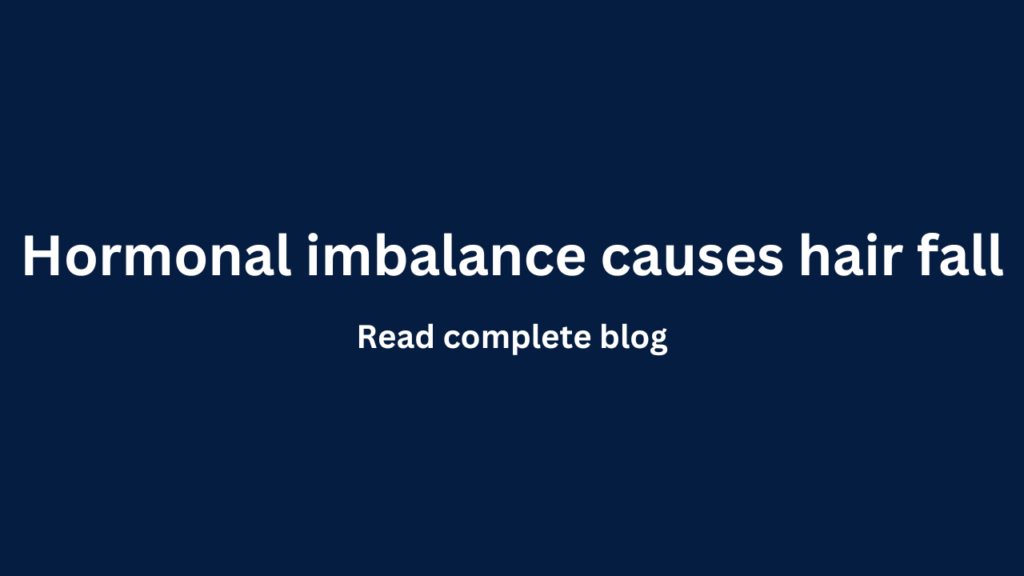Hormonal imbalances can have a significant impact on hair health, making hormones similar to hair androgen, estrogen, progesterone, and thyroid hormones through various mechanisms important in regulating the hair growth cycle. When these hormones become unstable, they can disrupt normal phases of hair growth, causing inordinate hair loss or thinning.
What is hormonal imbalance?
Hormonal imbalances can have an important impact on hair health, making hormones similar to hair androgen, estrogen, progesterone, and thyroid hormones through various mechanisms important in maintaining the hair growth cycle. When these hormones become unstable, they can disrupt normal phases of hair growth, causing inordinate hair loss or thinning. What’s the hormonal imbalance? Hormonal imbalance occurs when glands similar to the thyroid, adrenal glands, and ovaries, which produce inordinate or low quantities of hormones in the body, disrupting the normal functioning of various systems. Hormones are chemical couriers, which regulate metabolism, growth, and reproductive functions. When these hormonal levels disturb their balanced range, it can cause several symptoms, including mood swings, fatigue, and hair loss. Factors contributing to hormonal imbalances include stress, medical conditions, specifics, and life factors, all of which are important for overall health and heartiness.
Hair fall and its frequency:
Hair loss, or alopecia, is a common condition that affects millions of people around the world. It can range from normal thinning to significant hair fall, affecting both males and females. This is due to age, gender, and inheritable factors, conditions similar to androgenic alopecia or hair loss are particularly wide. Although hair loss is normal in aging, its impact on self-regard and quality of life also due to hormonal imbalances, stress, poor nutrition, or underlying health conditions makes it a major concern for numerous, leading to advances in ongoing examination and treatment.
How are hormones disturbing hair health and common hormonal imbalances cause hair fall?
Hormones like androgens, estrogens, and thyroid hormones play a pivotal part in regulating hair growth by impacting the hair growth cycle and follicle health.
Rule of androgens in hair fall.
Androgens, similar to testosterone and( DHT) play an important part in hair loss, These hormones affect hair follicles by syncopating the anagen( growth) phase of the hair cycle and dragging the telogen( resting) phase. High levels of androgens can lead to the shrinking of hair follicles, resulting in thinner, shorter hair and hair loss. In people with genetically androgenic alopecia, the effect of androgens on the hair follicles is more pronounced, causing hair growth to thin and fall out, especially in areas similar to the crown and temple in men, and thinning of the scalp in women.
Rule of estrogens in hair fall.
The estrogen hormone plays an important part in maintaining healthy hair growth by promoting the anagen( growth) phase of the hair cycle and dragging the duration of this phase. Estrogen helps keep hair thick, long, and healthy. However, a drop in estrogen levels, as seen during menopause, during pregnancy, or due to certain medical conditions, can bring thinning hair and increased falls. A decrease in estrogen levels disrupts the balance between hair growth and shedding, causing further hair follicles to enter the telogen( rest) phase precociously. This imbalance results in frequent thinning of the hair.
Hair fall due to thyroid hormone.
Thyroid hormone is important for regulating various body functions, including hair growth. Hypothyroidism( underactive thyroid) and hyperthyroidism( hyperactive thyroid) can have a significant impact on hair health. Hypothyroidism slows down metabolism and reduces the effectiveness of the hair growth cycle, it makes hair thin, and dry and exfoliates the hair. In difference, hyperthyroidism can accelerate the hair growth cycle, causing unseasonable hair loss and thinning of hairs. The imbalance in thyroid hormone levels disturbs the normal hair growth phases. Proper thyroid function is necessary for maintaining a healthy hair growth cycle and precluding hair loss or hair thinning.
Rule of cortisol hormone in hair fall.
Cortisol, often called the “stress hormone,” plays an important role in hair health and when levels are chronically elevated, it can contribute to hair loss. High cortisol levels, usually as a result of prolonged stress, can disrupt the hair growth cycle, pushing hair follicles into the telogen (resting) phase prematurely. This can lead to hair loss and thinning. Additionally, elevated cortisol can reduce levels of other hormones and nutrients necessary for healthy hair growth. Managing stress through lifestyle changes and relaxation techniques can help regulate cortisol levels and promote healthy hair.
How does PCOS lead to hair fall?
Polycystic ovary syndrome( PCOS) frequently causes hair loss due to its effects on hormonal balance. In PCOS, high levels of androgens, or manly hormones, can disrupt the normal cycle of hair growth. This hormonal imbalance can spark thinning of hair on the scalp, inflammation and insulin resistance associated with PCOS can increase hair loss. The combination of these factors can affect hair getting significantly thinner or exfoliated, which can be annoying and affect self-regard. operation of PCOS through drugs, life changes, and targeted treatment to help reduce the symptoms.
Menopause and hair fall.
Menopause frequently causes hair loss due to hormonal changes that cause hair growth. As estrogen levels drop during menopause, the balance between estrogen and androgens( male hormones) changes, causing hair thinning, and this hormonal disruption affects the hair follicles, shortening the growth phase and weakening the hairs. Stress and other symptoms of menopause can increase the problem, leading to more important medical treatments for hair loss and addressing hormonal imbalances through life adaptations to hair loss during this transition.
Diagnosis of hair fall reasons.
Diagnosing hair fall reasons begins with an evaluation of symptoms and medical history, followed by targeted blood tests to assess hormone levels that affect hair health and other tests to find out hair fall.
How to know the symptoms of hair fall through medical history?
To find out the symptoms of hair loss through a medical history, a detailed discussion of the case is a must. This includes asking about the onset, duration, and pattern of hair loss, The medical history should also explore any associated symptoms analogous to changes in skin texture, weight changes, or menstrual irregularities. It’s important to review the family history of hair loss, as heritable predilection may be a factor. examinations of formerly medical conditions, recent stress, specifics, and life habits give perception into possible beginning causes of hair loss.
Blood test to find out hair fall.
Blood tests include measuring situations of iron, ferritin, vitamin D, and thyroid hormones, as their drop or imbalance can lead to hair loss, the test evaluates the situations of other important nutrients similar as zinc and B vitamins. estimate these labels By doing so, health care providers can diagnose possible faults or hormonal imbalances that bring hair loss. This approach not only helps to identify the cause but also to develop applicable treatment strategies to meet the existent’s specific conditions to promote healthy hair growth.
Treatment of hair loss through hormones.
Treatment of hair loss through hormonal regulation constantly involves correcting imbalances or scarcities that affect hair health. A common approach is to use drugs that acclimate hormone situations, analogous to finasteride or minoxidil, which are conditions analogous to androgenetic alopecia by reducing the goods of dihydrotestosterone( DHT) on hair follicles. For women passing hair loss related to hormonal changes, analogous as due to menopause or polycystic ovary syndrome( PCOS), hormone remedy to stabilize hormone situations or hormones that affect hair growth at birth by targeting factors, these treatments aim to restore a healthy balance in the body, perhaps perfecting hair thickness
Treatment of hair falls through specifics.
Treatment of hair fall through generally specified drugs include minoxidil, which is applied topically to promote hair regrowth by adding blood inflow to the hair follicles, and fenestride, an oral drug that is a hormone linked to androgenetic alopecia. In addition, corticosteroids can be used to reduce inflammation in cases of autoimmune hair loss, analogous to alopecia.
Treatment of hair falls through life changes.
Treating hair loss through life changes involves espousing habits that promote overall health. A balanced diet rich in essential nutrients like iron, zinc, and vitamins A, C, and D can help to stop hair loss. Regular exercise improves blood circulation and supply important nutrients to the scalp. Reducing stress through ways like meditation, yoga, or deep breathing. Reduces stress that better hair loss. By integrating these changes in hair growth and hair care, stop heat styling, avoiding harsh chemical treatments, and espousing gentle hair care practices, avoid the use of mild detergents and conditioners, a person can produce a healthier atmosphere for hair growth.



